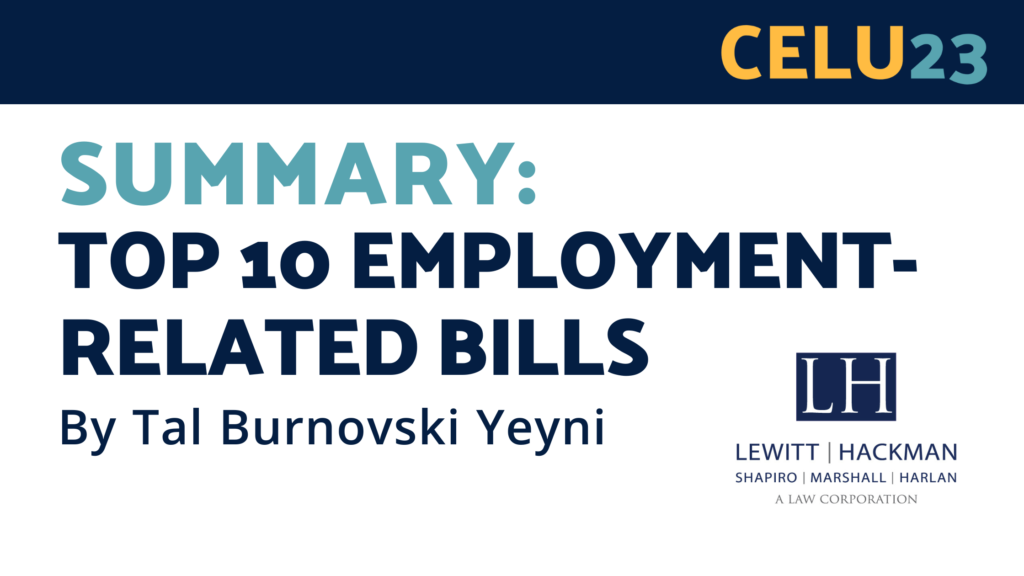Summary: Top 10 Employment-Related Bills
Summary: Top 10 Employment-Related Bills
| Below is a summary of the top 10 employment-related bills passed by the California Legislature and sent to Governor Gavin Newsom’s desk. If signed, these bills will go into effect on January 1, 2024.
Senate Bill 403: “Caste” as a protected category Accordingly, SB 403 seeks to amend the Unruh Civil Act, and the Fair Employment and Housing Act (FEHA) by adding “caste” to the list of protected categories. The bill also defines “ancestry” (which was already a protected category under FEHA, just not elucidated.) Per SB 403, “ancestry” would include, but not limited to, lineal descent, heritage, parentage, caste, or any inherited social status, and “Caste” means an individual’s perceived position in a system of social stratification based on inherited status. That may include, but is not limited to, inability or restricted ability to alter inherited status; socially enforced restrictions on marriage, private and public segregation, and discrimination; and social exclusion on the basis of perceived status.
Assembly Bill 524: “Family caregiver status” as a protected category AB 524 defines “family caregiver status” as a person who provides direct care to a spouse, child, parent, sibling, grandparent, grandchild, domestic partner, or, with respect to an existing employee, any individual previously identified by the employee as a “designated person.”
Senate Bill 848: Protected time off due to reproductive loss Generally, reproductive loss leave would need to be completed within three months of the event and would not have to be taken on consecutive days. Furthermore, SB 848 provides that reproductive loss leave would not run concurrently with other applicable leaves. An employer would not be required to provide paid reproductive loss leave, but an employee would be entitled to use vacation, personal leave, accrued and available sick leave, or compensatory time off that is otherwise available to the employee. If signed by the Governor, the leave would apply to employees who work for employers with five or more employees.
Senate Bill 616: Increasing entitlement for paid sick leave SB 616 could increase the caps on use and accrual so that the new cap on use would be 40 hours or five days per year. The new cap on accrual would be 80 hours or 10 days. If employers utilize a different accrual method, the accrual must be at a rate that employees accrue no less than 40 hours or five days of paid sick leave by the 200th calendar day in each year.
Assembly Bill 1356: Increasing notice period under Cal-WARN Responding to mass layoffs and the growing use of staffing agencies in tech companies, the Legislature passed AB 1356, which seeks, in part, to include a “client employer” in the definition of “employer” for purposes of compliance with the California Worker Adjustment and Retraining Notification Act. This, per the author, would close “the loopholes in critical layoff protection laws and [give] contract workers the basic protections that all workers at these large companies deserve.” AB 1356 further seeks to increase the notice period, from 60 to 75 days, which, per the author, would help “increase the economic safety net for some of our most vulnerable communities.”
Senate Bill 497: Creates a rebuttable presumption of retaliation SB 497 aims to expand these protections, and provides that any action taken against an employee within 90 days of the protected activity would create “a rebuttable presumption in favor of the employee’s claim.”
Senate Bill 731: Requires advance written notice prior to ending a remote work arrangement The notice must be in writing, sent via mail or email, and must include, at a minimum, the following text: Per the author, SB 731 would provide employees with disabilities sufficient time to a submit a request for continued remote work as a reasonable accommodation.
Senate Bill 525: Higher minimum wage for health care workers
Assembly Bill 1228: Higher minimum wage for fast food workers
Senate Bill 627: Required notice and hiring preferences for employees working at “chains” A chain employer must maintain a “preferential list of covered workers” with date of hire and position, and must make offers of transfers in order of “greatest length of service.” When a position becomes available, a chain employer must make a written offer within five business days, of all available positions for which covered workers are qualified. Violations of SB 627 may result in payment of back wages for each day the violation continues, as well as civil penalties and liquidated damages.
Senate Bill 699: Governor approves bill to invalidate out-of-state non-compete agreements SB 699 was already signed by Governor Newsom on September 1, 2023. The bill expands this prohibition to any non-compete provisions regardless of where and when the contract was signed. Per the declared purpose of the bill, this is to protect “the freedom of movement of persons whom California-based employers wish to employ to provide services in California, regardless of the person’s state of residence.” As further deterrence against non-compete restrictions, SB 699 provides that current, former, or prospective employees have:
AUTHOR Tal Burnovski Yeyni is an attorney at Lewitt Hackman. She defends employers in wage and hour, discrimination, harassment, retaliation, and other employee claims. |



